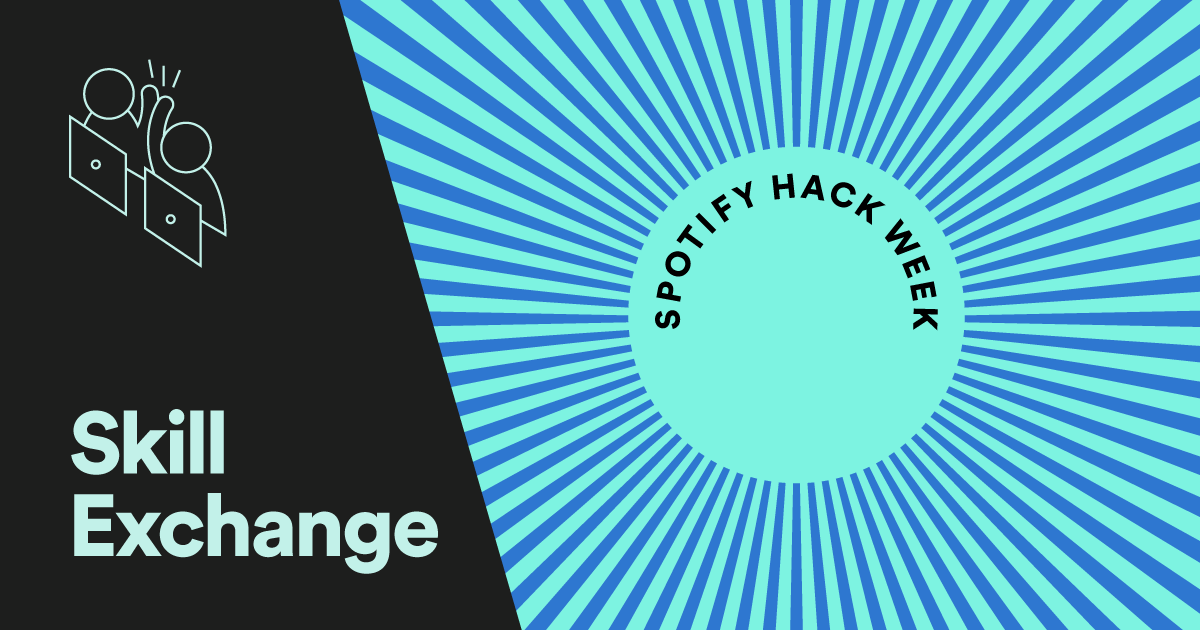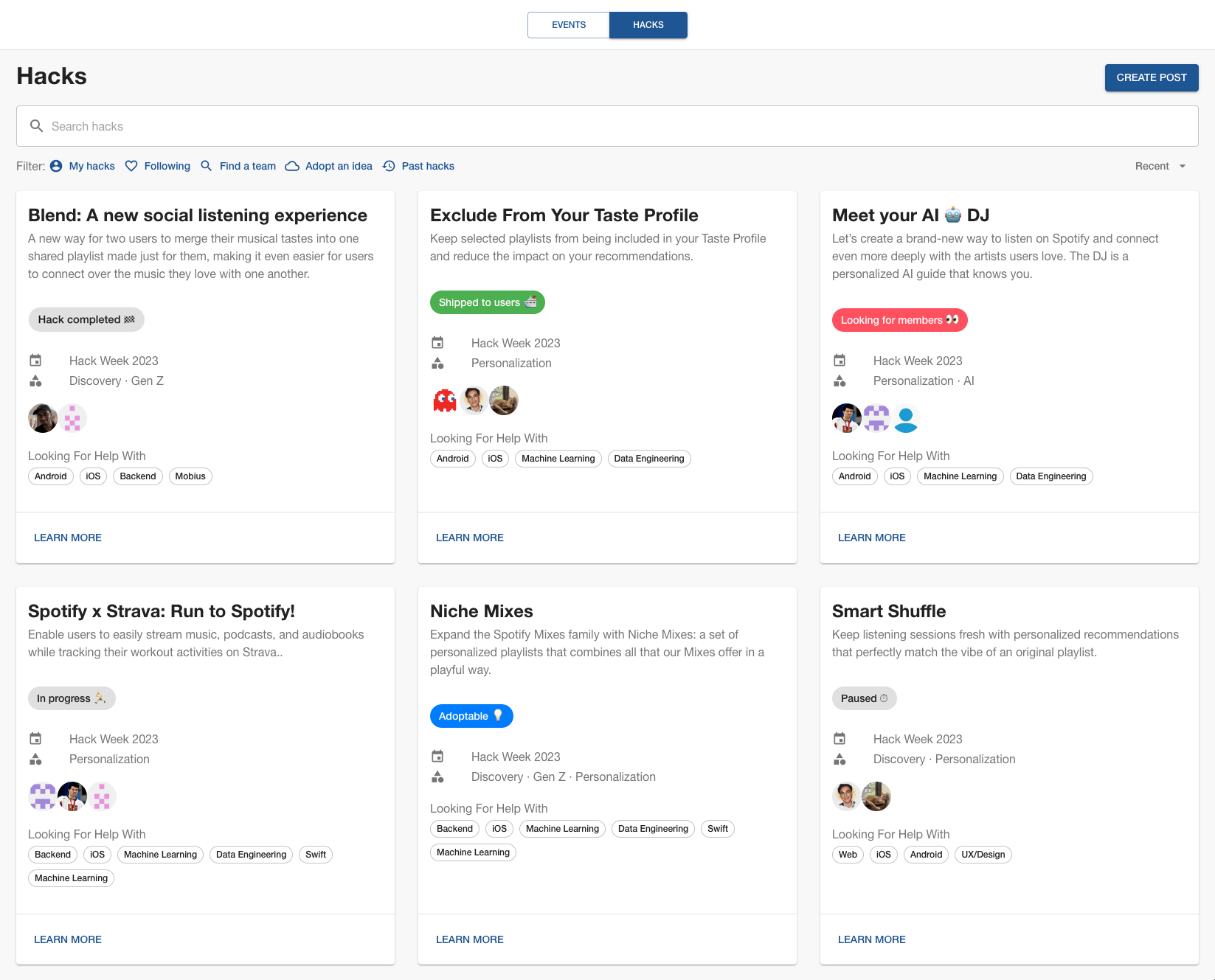How Spotify uses Skill Exchange to power our Hack Week
- Author
- Morgan Da Costa, Spotify
- Published

*tl;dr: Our Global Hack Week is a sacred tradition at Spotify — one that engages thousands of employees all over the world. And in our new distributed environment, it's essential that we create simple ways for employees across different teams and locations to collaborate. Skill Exchange does just that, powering our annual Hack Week and Spotify's hack culture year-round.*
At Spotify, we believe innovation comes from connecting people. That's why, every year, Spotifiers are invited to hit pause on business-as-usual and work on something different during our Global Hack Week. Hack Week brings together nearly 3,000 band members across our R&D teams to work on hundreds of different projects that have the potential to reshape our core products and how we work together at Spotify.
Some of our most beloved features have come out of Hack Week — including the now-essential Discover Weekly playlist, the Exclude from Your Taste Profile feature, and even Backstage itself (how meta 🤯)! For a little Spotify Hack Week history lesson, read our For The Record blog post with tips to create a successful hack week.
Sure, it all sounds great. But now imagine trying to elevate ideas, and connect people across teams and locations manually? 😱
Harnessing the hack energy
Skill Exchange is Spotify's marketplace to promote and seek out unique, on-the-job learning opportunities for our R&D teams. Skill Exchange lives as a plugin within our internal Backstage and is used by Spotifiers daily as they collaborate with and learn from their colleagues around the world via mentorships, embeds, or hacks.
We view hacks as a fundamental learning activity. Participants are encouraged to try out new skills, learn by doing, and build technical empathy with others during hack projects. Another fun fact: Skill Exchange actually started as a hack in 2019 (how meta 🤯 again), which makes it only natural that it now serves as our official home/automation for Hack Week.
Before Skill Exchange, we tried cataloging hack ideas in spreadsheets, docs, Slack channels, Workplace, and Jira… but the outcome was endless, unsearchable lists of ideas that hack participants were scrolling through for hours to find something that piqued their interest. These fragmented solutions resulted in duplicative hack efforts and difficulty finding the outcomes of incredible hacks. We saw the frustration clearly through Slack conversations to the tune of “I think someone hacked on this idea before?” 😕
After we spun up and deployed the Skill Exchange plugin within Backstage, Hack Week finally had a proper home. Hack Week participants use Skill Exchange as a centralized hub to pitch ideas, find hacks to join, and celebrate each other’s work – before, during, and after the main event. We’re connecting and collaborating better than before, and creating a higher volume of innovative ideas for Spotify instead of spinning our wheels, scrolling hacks and investigating if similar work has been done before.
So let’s dive in on how it works!
Hacking on Skill Exchange
In the month leading up to Hack Week, members of our R&D org navigate to Skill Exchange within Backstage to get inspired for Hack Week. Many of our users start their Hack Week journey by looking at the archive of hack projects within Skill Exchange. The archive consists of projects that have been tried before (even if they never made it past the hack phase) and the hacks that are continuing in development. This way hackers avoid duplicative efforts and bring a fresh perspective to hacks that might not have taken off before.
Once inspired by the hacks archive, hack creators can validate that their hack idea has never been tried before, join an existing hack, or build on top of a previous one. For those with an original hack idea, participants fill out a basic form on Skill Exchange where they share a catchy hack title, elevator pitch, links to documents or inspiration, and what skills they're looking for in prospective team members to make their hack come to life. Click to submit and voila! The hack page and link are created. If folks are particularly eager about their hack, they can spread the word and socialize their ideas by sharing the link to their hack page listing.
For other users looking to join a hack, they can search and browse through all the hacks by topic area or skill until they find their match. They can also browse hacks and follow the ones they’re interested in. When they’ve found a hack they’re inspired to work on, they can easily contact the hack creator through a Slack integration on the hack page that facilitates team-forming communication and reduces back-and-forth messaging.

During Hack Week, participants are hard at work collaborating with their colleagues, learning new skills, getting familiar with new tools, and building their hacks. Towards the end of the week, hack teams begin to bring their ideas to life and are able to attach demo videos, slide decks, and links to their repos to share all about their hack progress directly into their hack page -- including ways for Spotifiers to try out these fantastic prototypes for themselves.
Users can browse hacks on Skill Exchange and are able to vote on the hacks they love. Once voting ends, the top-voted hacks are celebrated and product teams across Spotify use the opportunity to evaluate this fresh new wave of ideas for future product developments. Regardless of votes or product potential, the greatest success of Hack Week is the amount of learning, connecting, and pride that results from investing time to explore and innovate. 🙌
Just like we make time to build skills through trainings, embeds, and mentorship, hacking is a regular practice at Spotify that happens throughout the other 51 weeks of the year. 🗓 Some teams have regular hack days and larger groups will host their own mini-hack weeks with a specific strategic focus. Last year alone, Spotify saw more than 33 other hack events outside of Global Hack Week. And you might have already guessed, but all these hacks also live on Skill Exchange where everyone at Spotify has visibility into what’s happening and can join them adhoc.
Want to build a hack culture? Go big first!
There’s a lot that goes into our Hack Week and maintaining Spotify’s hack culture; it takes work from several cross-functional teams to bring it to life. But with Skill Exchange, we’re able to easily elevate and connect so much brain power at Spotify to create truly fun and innovative ideas that not only drive our business forward, but also connect people from across the world to collaborate on projects and learn from one another.
It may seem intimidating to start building your organization's hack culture with a company-wide hack week, but we think you should! A hack week is a great starting point to build the collaboration muscle among your teams as well as an opportunity to bring remote workforces together and promote cross-pollination of ideas.
We’re already seeing Backstage adopters using the external Skill Exchange plugin to do this! Folks using Skill Exchange as their hack week hub are seeing increases in the volume and quality of hack projects as well as greater participation. We’re also hearing feedback from customers that running a hack week on Skill Exchange is proving to be a helpful lever to drive wider adoption and usage of their entire developer portal — which definitely rings true to what we’ve seen at Spotify (more to come on that topic)!
Interested in making hacking a thing at your company? Learn more about Skill Exchange or book a demo.